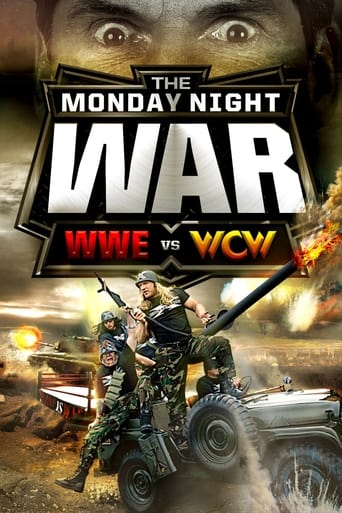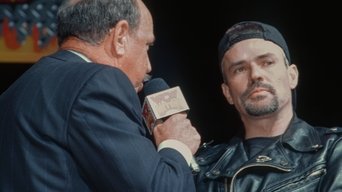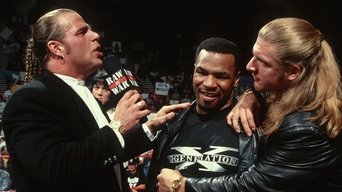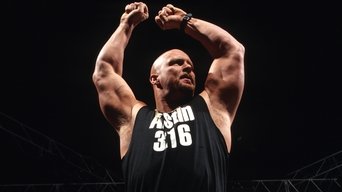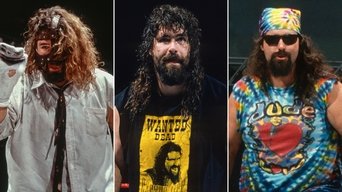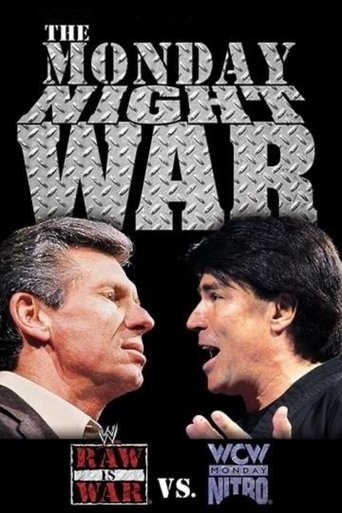The Monday Night War: WWE vs. WCW Season 1

A documentary about the period in sports entertainment, known as the Monday Night Wars. Includes interviews with past and present on-air personalities. Also includes looking back on superstars and storylines that made the Monday Night Wars so memorable.
Watch NowWith 30 Day Free Trial!
The Monday Night War: WWE vs. WCW
2014
A documentary about the period in sports entertainment, known as the Monday Night Wars. Includes interviews with past and present on-air personalities. Also includes looking back on superstars and storylines that made the Monday Night Wars so memorable.
Watch Trailer
With 30 Day Free Trial!
The Monday Night War: WWE vs. WCW Season 1 Full Episode Guide
Vince McMahon emerged victorious in the Monday Night War, but questions remained as to what the future held for his company as talents new and old began to cross enemy lines.
World Championship Wrestling was searching for answers in the face of Monday Night Raw's rising momentum, but backstage politics, corporate mergers, and questionable creative decisions would ultimately doom sports-entertainment's former powerhouse. Not Eric Bischoff, former WWE writer Vince Russo, or even a combination of the two could save WCW.
With WCW facing early troubles, Eric Bischoff steers the company in a new, far more profitable direction. World Championship Wrestling's success would breed backstage politics and inflated egos. As sports entertainment reached unprecedented highs, the strategies that helped Eric Bischoff build WCW would hasten the decline of the company.
A passion for sports entertainment and collection of abrasive personalities form an exclusive backstage bond in five WWE superstars who would all go on to buck tradition and propel both WWE and WCW to new heights amidst controversy and an ever-lasting friendship.
It takes an army to win a war, and both WCW and WWE were developing a deep roster in order to emerge victorious. The competition between the two companies made household names of previously unknowns talents, but one leader and one vision would be required to be named sports entertainment's crowned champion.
WWE and WCW incorporated celebrities into their programming with decisions that would ultimately decide the fate of each company. Sports Entertainment became a recognized mainstream attraction during the Monday Night War, and its superstars became celebrities in their own right.
In an era of shifting loyalties, Sting and The Undertaker would anchor their respective franchises throughout the Monday Night War, and evolve their characters in order to stay atop their rosters during sports entertainment's most competitive and prosperous years.
WWE and WCW were breaking traditions in order to gain an edge in the ratings. As the bar was being raised and the envelope pushed, the expansion of female personalities in both companies would forever change perceptions and gender roles in sports entertainment.
After a rocky start in WWE, a third-generation superstar would tap into his real personality and help shift the tide of the Monday Night War. With skills in the ring and on the microphone, The Rock's creativity and charisma made him one of the biggest names in all of entertainment.
Burdened with cruiserweight labels, Chris Jericho made a name for himself with a unique blend of talent, creativity, and desire. After crossing enemy lines in a surprising defection, Jericho would leave an indelible impact on both WWE and WCW throughout the Monday Night War.
Bill Goldberg's dominance and infectious intensity gave WCW a homegrown talent that helped carry the company in the face of WWE's building momentum. His meteoric rise and undefeated reign atop WCW was not without its decline, but World Championship Wrestling struck gold in a pro-football player turned sports-entertainment megastar.
In an effort to break away from sports-entertainment traditions and differentiate themselves from WWE, WCW signed unique talents from around the world to develop their Cruiserweight Division. The result was a high-flying group of Superstars that would help Nitro defeat Raw in the ratings for nearly two years.
Pioneering WWE's Attitude Era as the new face of an anti-establishment upswing, "Stone Cold" Steve Austin scratched, kicked, and clawed his way to the top of sports-entertainment on his own terms. Austin's employee vs. employer rivalry with Mr. McMahon paved the way for Monday Night Raw to emerge victorious over Monday Nitro.
While WWE and WCW battled in primetime, Extreme Championship Wrestling was building a cult following in an alternative counter-culture. Pushing the envelope and smashing traditions, Paul Heyman's hardcore, underground promotion sent shockwaves across sports entertainment, and triggered an evolution in both of the industry's top two organizations.
Once the proud face of WWE, Bret Hart found himself being phased out of Monday Night Raw's evolving Attitude Era in favor of bitter rival Shawn Michaels. Signing with WCW, Hart's final night as Vince McMahon's champion would become one of the most controversial events in sports-entertainment history, and forever change the fate of both WWE and WCW.
Mick Foley's unorthodox style got him released from WCW, but made him a sports entertainment legend in the years that followed. In a tale of blood, sweat, and socks, Foley emerged as an unlikely hero, and his passion and perseverance was just the weapon WWE needed to help Raw take control of the Monday night ratings.
Shawn Michaels and Triple H look to buck tradition and make WWE's flagship show a more contemporary, realistic product. Helping usher in WWE's Attitude Era by pulling back the curtain and bringing their unique brand of humor and hijinks to the primetime stage, these two superstars form D-Generation X.
With his back against the wall, Vince McMahon commands a company-wide change in a direction that would buck tradition and shift the tide in the Monday Night War. Adding contemporary elements to his evolving program, Monday Night Raw would experience unprecedented success as well as outside criticism.
Eric Bischoff brought change to WCW as two of WWE's top talents, Scott Hall and Kevin Nash, had crossed enemy lines and redefined character roles before joining Hulk Hogan to form the villainous New World Order faction. Monday Nitro's band of anti-heroes would forever change the course of sports-entertainment history.
Determined to capture the same success as sports-entertainment's national leader Vince McMahon, media mogul Ted Turner launches WCW Monday Nitro in direct competition with WWE's Monday Night Raw. With the help of newly anointed Executive Vice President Eric Bischoff, World Championship Wrestling rises to national prominence.
Free Trial Channels
Seasons


